
Akinwande Oluwole Babatunde Soyinka Hon. FRSL, known as Wole Soyinka, is a Nigerian playwright, novelist, poet, and essayist in the English language. He was awarded the 1986 Nobel Prize in Literature for his "wide cultural perspective and... poetic overtones fashioning the drama of existence", the first sub-Saharan African to be honoured in that category.
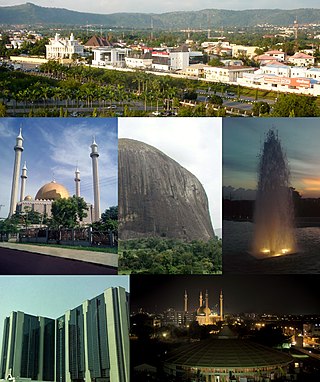
Abuja is the capital and eighth most populous city of Nigeria. Situated in the middle of the country within the Federal Capital Territory (FCT), it is a planned city built mainly in the 1980s based on a master plan by International Planning Associates (IPA), a consortium of three American planning and architecture firms made up of Wallace, Roberts, McHarg & Todd as the lead, Archi systems International, and Planning Research Corporation. The Central Business District of Abuja was designed by Japanese architect Kenzo Tange. It replaced Lagos, the country's most populous city, as the capital on 12 December 1991.

Chinua Achebe was a Nigerian novelist, poet, and critic who is regarded as a central figure of modern African literature. His first novel and magnum opus, Things Fall Apart (1958), occupies a pivotal place in African literature and remains the most widely studied, translated, and read African novel. Along with Things Fall Apart, his No Longer at Ease (1960) and Arrow of God (1964) complete the "African Trilogy". Later novels include A Man of the People (1966) and Anthills of the Savannah (1987). In the West, Achebe is often referred to as the "father of African literature", although he vigorously rejected the characterization.
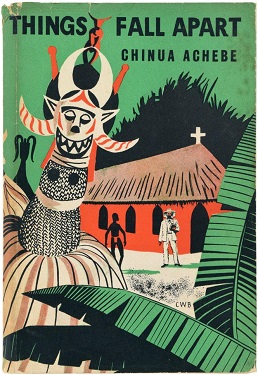
Things Fall Apart is the debut novel of Nigerian author Chinua Achebe first published in 1958. It depicts the events of pre-colonial life in Igboland and the subsequent appearance of European missionaries and colonial forces in the late 19th century. It is seen as an archetypal modern African novel in English, and one of the first novels to receive global critical acclaim. It is a staple book in schools throughout Africa and is widely studied in English-speaking countries around the world. The novel was first published in the United Kingdom in 1958 by William Heinemann Ltd and became the first work published in Heinemann's African Writers Series.

Chimamanda Ngozi Adichie is a Nigerian writer, novelist, poet, essayist, and playwright of postcolonial feminist literature and public speaker. She is the author of the award-winning novels Purple Hibiscus (2003), Half of a Yellow Sun (2006) and Americanah (2013). Her other works include the book essays We Should All Be Feminists (2014); Dear Ijeawele, or A Feminist Manifesto in Fifteen Suggestions (2017); a memoir tribute to her father, Notes on Grief (2021); and a children's book, Mama's Sleeping Scarf (2023).
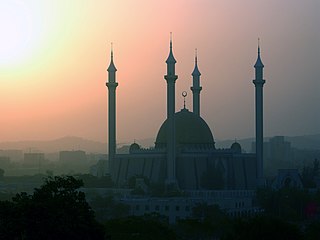
The Harmattan is a season in West Africa that occurs between the end of November and the middle of March. It is characterized by the dry and dusty northeasterly trade wind, of the same name, which blows from the Sahara over West Africa into the Gulf of Guinea. The name is related to the word haramata in the Twi language. The temperature is cold mostly at night in some places but can be very hot in certain places during daytime. generally, temperature differences can also depend on local circumstances.

Cinema of Africa covers both the history and present of the making or screening of films on the African continent, and also refers to the persons involved in this form of audiovisual culture. It dates back to the early 20th century, when film reels were the primary cinematic technology in use. During the colonial era, African life was shown only by the work of white, colonial, Western filmmakers, who depicted Africans in a negative fashion, as exotic "others". As there are more than 50 countries with audiovisual traditions, there is no one single 'African cinema'. Both historically and culturally, there are major regional differences between North African and sub-Saharan cinemas, and between the cinemas of different countries.
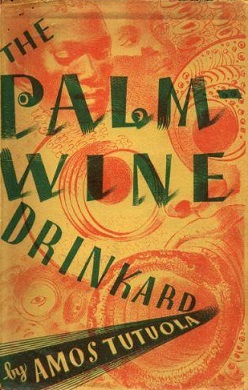
The Palm-Wine Drinkard is a novel published in 1952 by the Nigerian author Amos Tutuola. The first African novel published in English outside of Africa, this quest tale based on Yoruba folktales is written in a modified English or Pidgin English. In it, a man follows his brewer into the land of the dead, encountering many spirits and adventures. The novel has always been controversial, inspiring both admiration and contempt among Western and Nigerian critics, but has emerged as one of the most important texts in the African literary canon, translated into more than a dozen languages.
African literature is literature from Africa, either oral ("orature") or written in African and Afro-Asiatic languages. Examples of pre-colonial African literature can be traced back to at least the fourth century AD. The best-known is the Kebra Negast, or "Book of Kings" from the 14th century AD. Another well-known book is the Garima Gospels, one of the oldest known surviving bibles in the world, written in Ge'ez around 500 AD.
Syl Cheney-Coker is a poet, novelist, and journalist from Freetown, Sierra Leone. Educated in the United States, he has a global sense of literary history, and has introduced styles and techniques from French and Latin American literatures to Sierra Leone. He has spent much of his life in exile from his native country, and has written extensively about the condition of exile and the view of Africa from an African abroad.
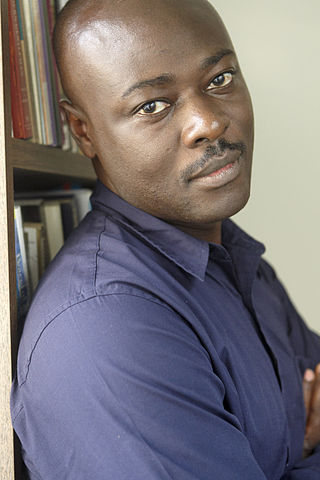
Helon Habila Ngalabak is a Nigerian novelist and poet, whose writing has won many prizes, including the Caine Prize in 2001. He worked as a lecturer and journalist in Nigeria before moving in 2002 to England, where he was a Chevening Scholar at the University of East Anglia, and now teaches creative writing at George Mason University, Fairfax, Virginia.

Black science fiction or black speculative fiction is an umbrella term that covers a variety of activities within the science fiction, fantasy, and horror genres where people of the African diaspora take part or are depicted. Some of its defining characteristics include a critique of the social structures leading to black oppression paired with an investment in social change. Black science fiction is "fed by technology but not led by it." This means that black science fiction often explores with human engagement with technology instead of technology as an innate good.

A Man of the People is a novel by Nigerian writer Chinua Achebe. Written as a satirical piece, "A Man of the People" follows the story told by Odili, a young and educated narrator, about his conflict with Chief Nanga, his former teacher who enters a career in politics in an unnamed fictional 20th-century African country. Odili represents the changing younger generation, while Nanga represents the traditional West African customs inspired by Achebe's native Nigeria. The book ends with a military coup, similar to the real-life coup organized by Major Chukwuma Kaduna Nzeogwu, Major Adewale Ademoyega, Major Emmanuel Ifeajuna, Captain Chris Anuforo, Major Donatus Okafor, and Major Humphrey Chukwuka.
Ikot Udo Abia is a village in ward four of the Etinan local government area, Akwa Ibom State, Nigeria. "Ikot Udo Abia" means followers of Udo Abia. The villagers are the Ibibio people who are of the Afaha group within the Iman Clan. The language spoken in the village isIbibio. Ikot Udo Abia lies in the area of Africa which was affected by the Atlantic slave trade of the sixteenth to nineteenth centuries.
Anti-African sentiment, Afroscepticism, or Afrophobia is prejudice, hostility, discrimination, or racism towards people and cultures of Africa and of the African diaspora.
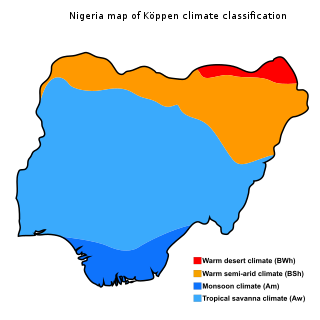
The climate of Nigeria is mostly tropical. Nigeria has three distinct climatic zones, two seasons, and an average temperature ranging between 21 °C and 35 °C. Two major elements determine the temperature in Nigeria: the altitude of the sun and the atmosphere's transparency. Its rainfall is mediated by three distinct conditions including convectional, frontal, and orographical determinants. Statistics from the World Bank Group showed Nigeria's annual temperature and rainfall variations, the nation's highest average annual mean temperature was 28.1 °C in 1938, while its wettest year was 1957 with an annual mean rainfall of 1,441.45mm.
Stephen Buoro is a Nigerian writer known for his distinctive voice and narrative style in contemporary African literature. He gained recognition with his debut novel, The Five Sorrowful Mysteries of Andy Africa, published in 2023 by Bloomsbury.

9: Harmattan & Winter, also known simply as Harmattan & Winter, is the ninth studio album by Nigerian singer Brymo. It was released on September 9, 2021, along with 9: Èsan. The album comprises nine tracks and is a combination of alternative rock, folk, sentimental ballad, and fusion-rock. Recorded entirely in English, Harmattan & Winter addresses topics of heartbreak, self-discovery, romance, mental health, and monogamy. Bigfoot produced the entire album, which deviates from Libel's subtle denial and Yellow's hedonistic perspective. The title track, "Harmattan & Winter," was released as the album's only single. Harmattan & Winter received positive reviews from music critics, who called it a "morose album" and praised Brymo's songwriting.
Aiwanose Odafen is a Nigerian feminist writer. She was born in Lagos, Nigeria. Her first novel, Tomorrow I Become a Woman, was published in 2022 and her second novel, We Were Girls Once, in 2024. She attended Nigerian Turkish International Colleges, graduating in 2009. As a high school student, she won gold and silver medals in the Nigerian National Mathematics Olympiad Competition. In 2013, she graduated from Covenant University with a first-class degree in Accounting, earning the distinction of Best Graduating Student in the Department of Accounting, School of Business and College of Development Student.
The Last Harmattan of Alusine Dunbar is a novel by Syl Cheney-Coker. It won the Africa region of the 1991 Commonwealth Writers' Prize. The novel uses magical realism to comment on events by a prophet in the after-life.












